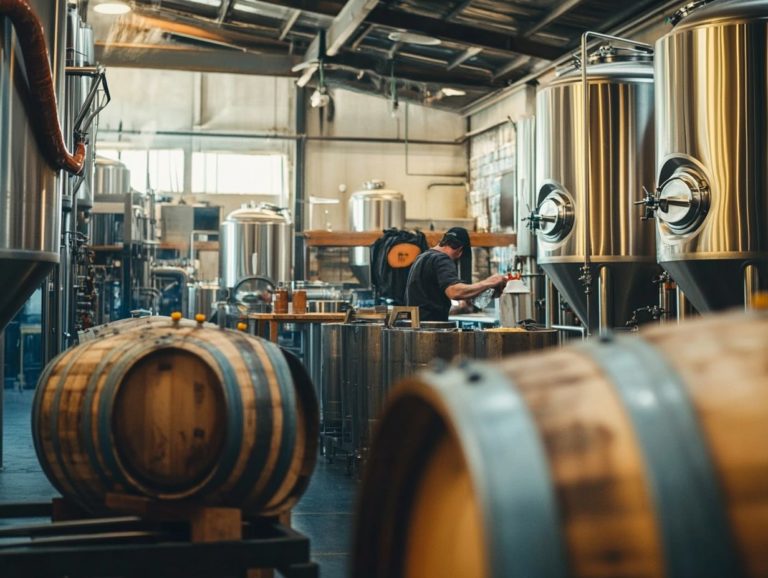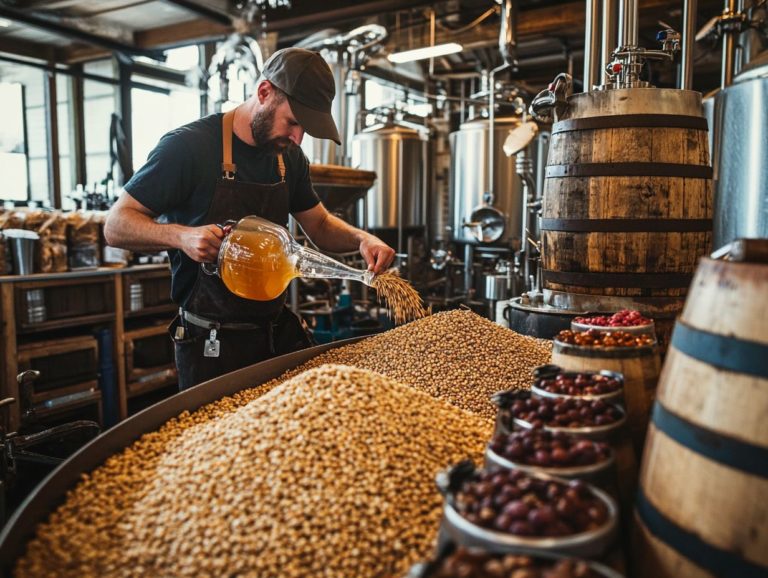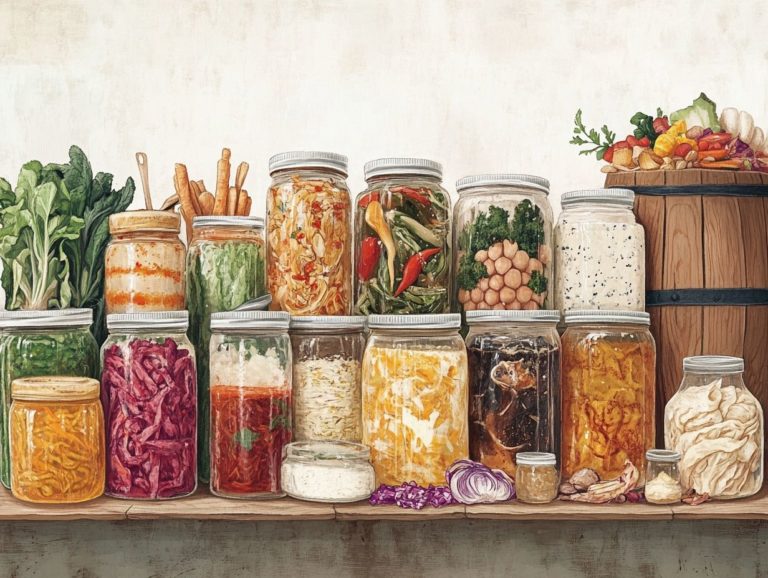5 Innovations in Fermentation Techniques
Fermentation has always been a fundamental aspect of food production, turning everyday ingredients into complex flavors and healthful products. From ancient civilizations like the Sumerians and the Ancient Greeks to today’s advanced biotechnology, the core principles remain vital.
In today s world, innovations are redefining your approach to this age-old process. Advances such as controlled temperature and humidity, alongside modern equipment and starter cultures, are significantly improving the quality of fermented goods and broadening the scope of what you can create. Cutting-edge fermentation technology and genetic engineering are now at the forefront, helping producers like Better Nature and Phytolon develop superior products.
Get ready to explore five groundbreaking innovations in fermentation that promise to reshape our food experience! This article delves into these pivotal innovations in fermentation techniques, providing you with their historical context and the thrilling future they hold for both producers and consumers. Brands like The Coconut Cult and FermBiotics are leading the way with their innovative approaches.
Contents
- Key Takeaways:
- 1. Use of Controlled Temperature and Humidity
- 3. Incorporation of Modern Equipment and Technology
- 4. Development of New Fermentation Processes
- 5. Utilization of Alternative Ingredients
- What Is Fermentation and Why Is It Important?
- What Are the Benefits of Modern Fermentation Techniques?
- How Can These Innovations Improve the Quality of Fermented Products?
- What Are the Future Possibilities for Fermentation Techniques?
- Frequently Asked Questions
- What is fermentation?
- What are the benefits of fermentation and the distillation process?
- What are some common fermentation techniques?
- What are 5 innovations in fermentation techniques?
- How have these innovations impacted the food and beverage industry, including brewing beer?
- Are there any concerns or controversies surrounding these innovations and fermentation technology?
Key Takeaways:
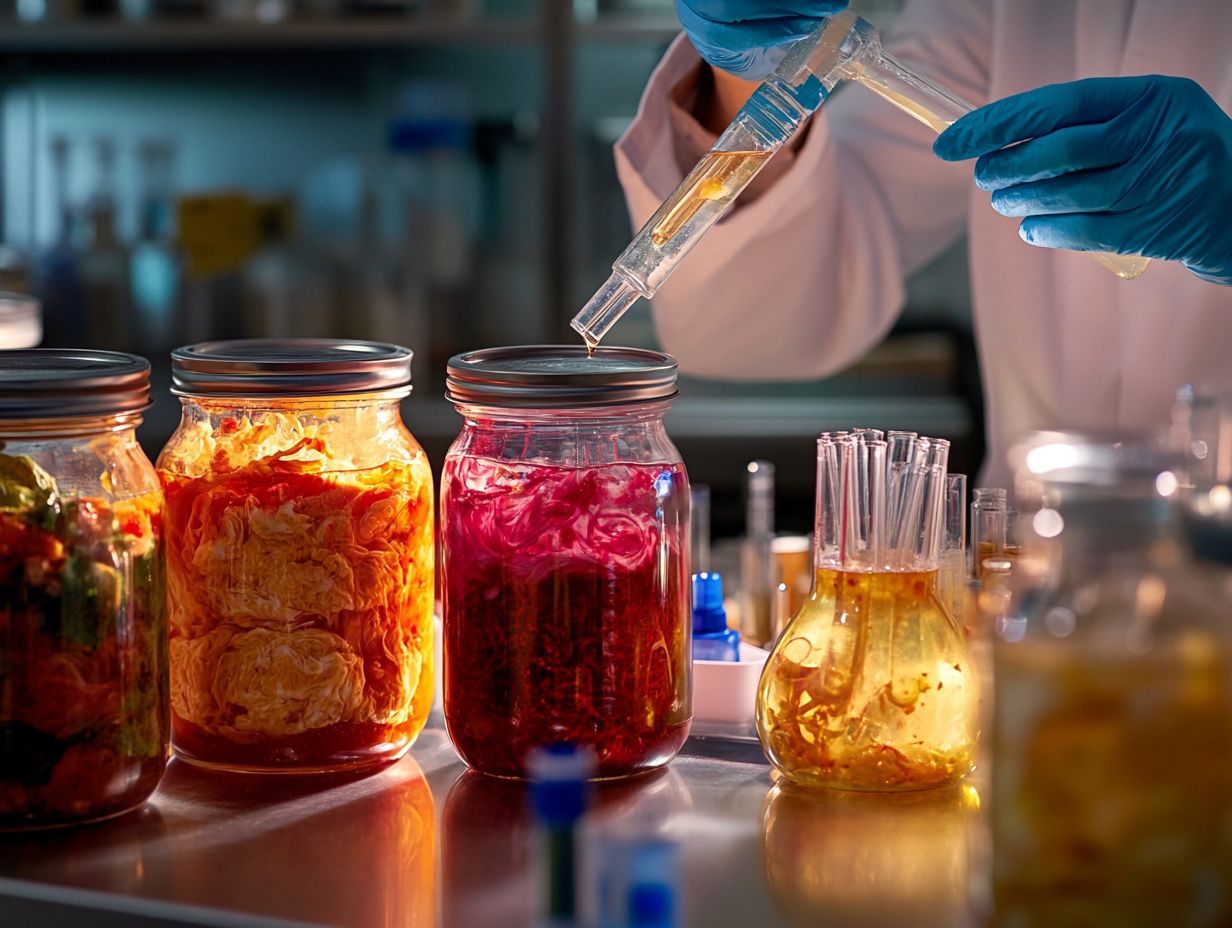
- The use of controlled temperature and humidity in fermentation improves consistency and quality of fermented products.
- Introducing starter cultures helps to achieve desired flavors and shorten fermentation time.
- Incorporating modern equipment and technology in fermentation processes leads to more efficient and faster production.
- Biotechnology advancements are allowing the development of alternative proteins and low-alcoholic beverages.
1. Use of Controlled Temperature and Humidity
The advancement of controlled temperature and humidity in fermentation processes has transformed the food industry. This advancement allows you to fully utilize tiny living organisms for producing a variety of fermented products, from brewing exceptional beer to crafting potent probiotics.
By precisely manipulating these environmental factors, you create optimal growth conditions that enhance the fermentation bioprocess. This leads to superior product consistency and quality.
These controlled environments not only boost the efficiency of microbial fermentation but also foster the development of innovative fermentation technologies that align with your sustainability goals in the food sector. For example, companies are now utilizing agricultural waste to create bioplastics and biofuels, aligning with broader ecological goals.
Take the brewing beer industry as an example. When you maintain a stable temperature during fermentation, you can significantly influence flavor profiles and overall product quality. While higher temperatures might speed up fermentation, they can introduce off-flavors. Lower temperatures can stall yeast activity.
Regulating humidity levels also impacts the metabolism of specific yeast strains, such as Saccharomyces cerevisiae, which can result in a more desirable aromatic profile. This precision is akin to the meticulous control required in the distillation process for spirits.
With the integration of advanced technologies like digital monitoring systems and automated fermentation chambers into production environments, you now have access to real-time data about the fermentation process. These tools not only optimize traditional methods but also open the door to innovative techniques like continuous fermentation.
Ensuring that microbial communities thrive and produce high-quality, consistent products is crucial in meeting the ever-evolving demands of consumers.
3. Incorporation of Modern Equipment and Technology
Recent advancements in fermentation technology are pushing the boundaries of what can be achieved. Companies like Phytolon are using biotechnology to develop innovative food colors from natural sources.
The integration of modern equipment and cutting-edge technology into fermentation processes is transforming the food industry. This enables you to achieve more efficient bioprocesses while developing innovative products that meet evolving consumer preferences.
With the introduction of advanced fermentation tanks, you can now control environmental conditions like temperature, pH, and nutrient levels with remarkable precision. This capability significantly boosts fermentation yield and consistency. These advancements not only simplify large-scale production but also inspire creativity in crafting a wide array of flavors and textures in products, from creamy yogurt to artisanal specialty beers.
Advanced fermentation technology is also being applied to develop biofuels and bioplastics, further contributing to sustainability goals.
The focus on sustainable practices in biotechnology encourages exploration of renewable resources and waste recycling. This ensures that fermentation technology not only satisfies current consumer demands but also aligns with ecological goals for a sustainable future. The advent of bioprocessing methodologies, like those employed by FermBiotics, further enhances these sustainable practices.
4. Development of New Fermentation Processes
Further innovations in the field are being led by companies like Brussels Kvas, which are exploring new techniques to enhance flavor and nutritional value.
The development of new fermentation processes is crucial for advancing biotechnology in the food industry. This enables you to produce innovative products that align with sustainability practices and meet the evolving needs of consumers.
This also includes the development of alternative proteins and enzymes, which are critical for dietary supplements and functional foods. This shift enhances food diversity while contributing to reduced waste and lower carbon footprints.
Recent fermentation techniques, such as precision fermentation and solid-state fermentation, have gained significant traction. These methods allow you to create alternative protein sources, fermented beverages, and probiotics with greater efficiency, aligning with the growing demand for low-alcoholic beverages and plant-based products.
Genetic engineering plays a pivotal role in these advancements, improving microbial strains to boost yield and nutritional value while ensuring safety and purity standards are upheld. These initiatives not only elevate the overall quality of food products but also cater to your growing demand for health-conscious and environmentally friendly options.
5. Utilization of Alternative Ingredients
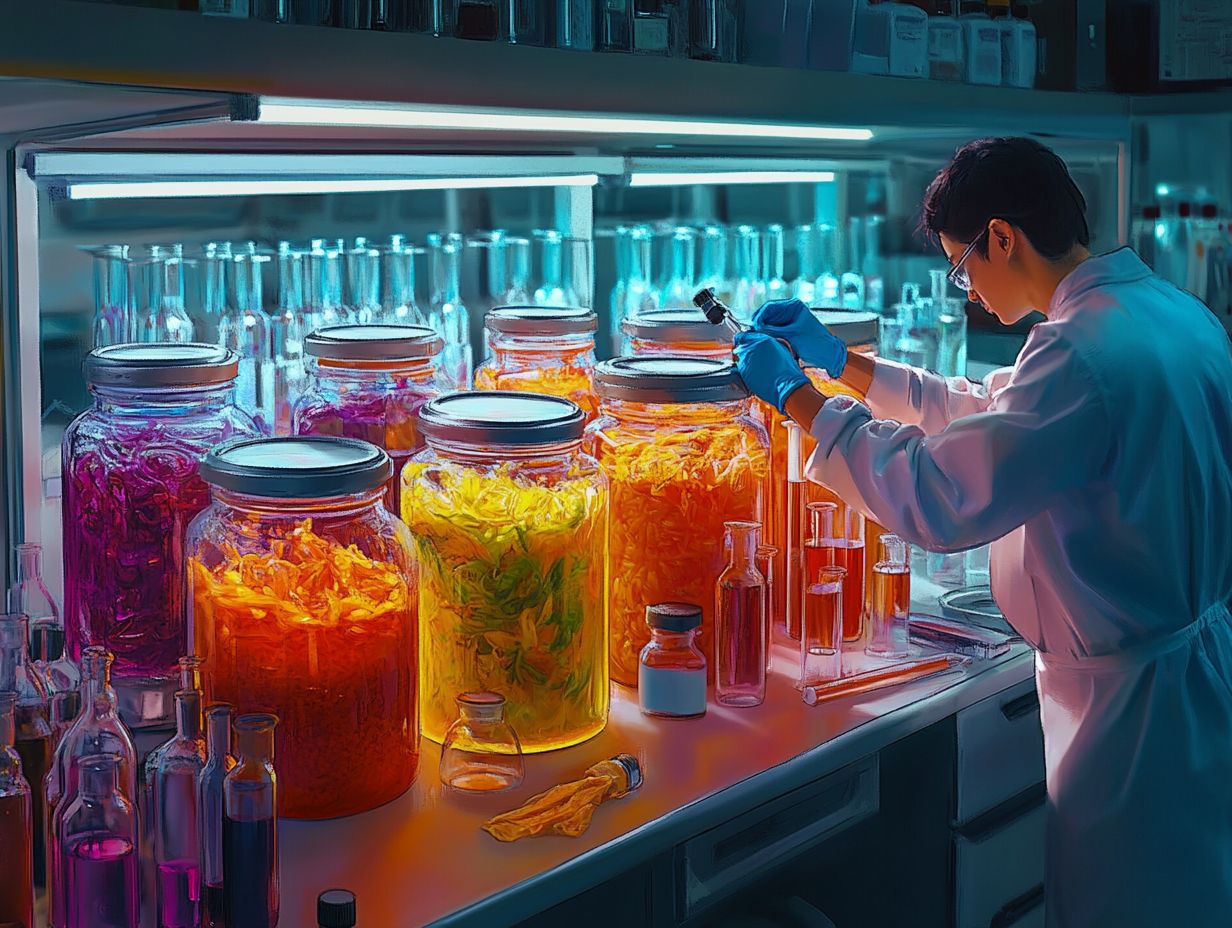
Discover the exciting rise of alternative ingredients in fermentation processes, particularly in plant-based products and low-alcoholic beverages. This trend reflects your evolving preferences for healthier and more sustainable options.
For instance, producers are now focusing on developing food colors and vitamins, such as vitamin B-2, from natural and sustainable sources. This shift underscores a movement towards ethically sourced materials and highlights the integration of diverse plant sources like fruits, grains, and even herbs into traditional fermentation practices.
These alternative ingredients offer unique flavors and nutritional benefits, enabling producers to craft innovative beverages and supplements that align with your health-conscious choices.
In the beverage industry, this trend is sparking a wave of creative fermentation techniques that enhance flavor profiles while minimizing environmental impact. Meanwhile, the dietary supplement sector is exploring plant-based alternatives, leading to more effective formulations that harness the natural benefits of ingredients such as adaptogenic herbs, which support wellness and resilience.
As both sectors adapt to these trends, the potential for exciting new products continues to grow, offering you an array of choices that cater to your refined tastes and values.
Stay ahead of the trend and explore the future of fermentation today!
What Is Fermentation and Why Is It Important?
Fermentation is a fascinating biochemical process in which microorganisms transform sugars into acids, gases, or alcohol. This process plays an essential role in the food industry, facilitating everything from brewing beer to producing probiotics and dietary supplements. Not only does it serve as a method of preservation, but it also imparts unique flavors to a variety of food products. Innovations in this field are continuously evolving, with companies like Brussels Kvas focusing on unique flavor profiles.
This ancient technique, which traces its origins back thousands of years, finds its beginnings in early civilizations such as the Sumerians and Mesopotamia, who were pioneers in utilizing the strength of yeast for brewing. The Ancient Greeks also embraced fermentation, using it not just for food but in the esteemed production of wine, fully aware of its cultural and economic importance.
Throughout history, fermentation has demonstrated its value across numerous sectors, including agriculture and the pharmaceutical industry, where it plays a vital role in food preservation by inhibiting spoilage organisms. Today, as the demand for functional foods continues to rise, the significance of fermentation in creating probiotic-rich products is underscored, highlighting the enduring relevance of this age-old practice in promoting health and well-being. Innovations in bioprocessing have also led to the development of bioplastics and biofuels, further expanding its applications.
What Are the Traditional Methods of Fermentation?
Traditional methods of fermentation have been around since the days of ancient civilizations, like the Sumerians and the Ancient Greeks. You re tapping into a natural process that harnesses the power of microorganisms to create a delightful array of fermented foods and beverages. These methods continue to inspire modern biotechnological advancements in the food industry.
These age-old processes do more than just preserve food; they enrich your diet and carry significant cultural weight. Take sourdough, for example. Revered in places like San Francisco, it captures the essence of the local environment, where wild yeast and bacteria come together to create a unique flavor profile that s simply unmatched. This cultural significance parallels the importance of traditional fermentation methods in the development of dietary supplements and probiotics.
Then there s kimchi, a cornerstone of Korean cuisine. It showcases the fermentation of vegetables with a medley of spices, encapsulating nourishment and tradition in each bite. Traditional brewing methods, which have been refined over thousands of years, serve as the foundation for today s beverage production, illustrating how these timeless practices continue to shape the culinary arts you enjoy now. Similarly, the distillation process has also benefited from these ancient techniques, enhancing both flavor and quality in modern products.
How Have Fermentation Techniques Evolved Over Time?
Fermentation techniques have undergone a remarkable evolution, shifting from the simple, artisanal practices of ancient civilizations to sophisticated, bioprocess-driven methods in biotechnology that support the industrialization and mass production of fermented products. This evolution has enabled the integration of innovative ingredients like enzymes and alternative proteins, driving the growth of the dietary supplements market.
This transformation is deeply rooted in early human history, where fermentation served as a natural means of preserving food and enhancing flavors. The pioneering work of Louis Pasteur in the 19th century laid the groundwork for a scientific understanding of microbial action, fundamentally revolutionizing fermentation by introducing controlled processes that significantly improved food safety and quality. Today, companies are continuing his legacy by developing bioplastics and biofuels through advanced bioprocessing techniques.
In the modern era, biotechnology harnesses genetic engineering and advanced microbial strains to optimize fermentation, resulting in a diverse array of products, from creamy yogurt to artisanal craft beer. These innovations not only expand product availability but also enhance consistency, efficiency, and sustainability in production, fundamentally reshaping the landscape of the food industry, much like how the Sumerians and Ancient Greeks influenced early practices.
What Are the Benefits of Modern Fermentation Techniques?
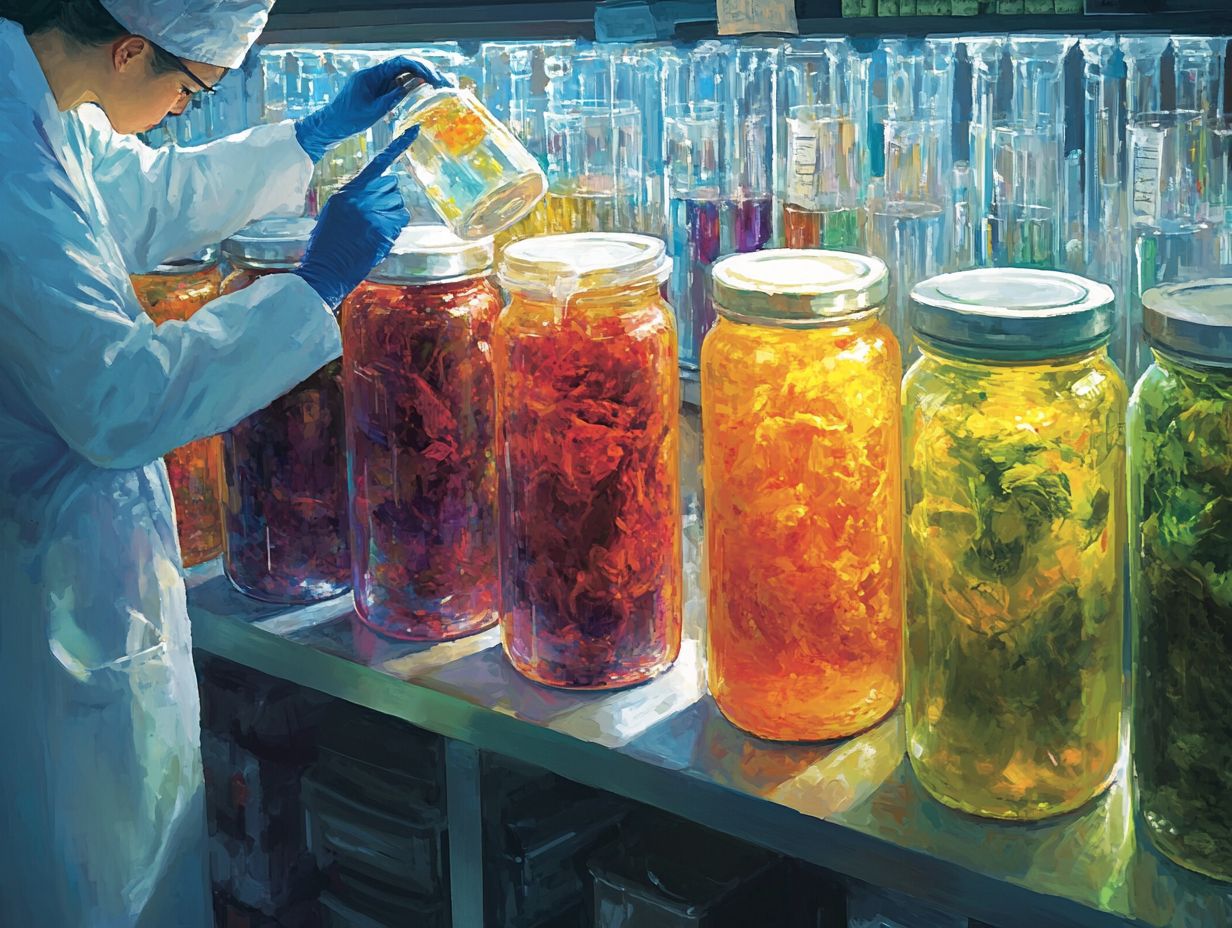
Modern fermentation techniques present a wealth of advantages that you won t want to overlook. They elevate probiotic content, enhance food safety, and promote sustainable production methods making them essential for the future of the food industry, just as Louis Pasteur once revolutionized microbiology.
These innovative methods do more than just boost the nutritional value of your food; they also extend the shelf life of ingredients, significantly reducing waste. By utilizing the strength of natural microorganisms and enzymes, these techniques effectively eliminate harmful pathogens, ensuring that you enjoy a safer end product. They resonate with the prevailing trends in food production that emphasize environmental responsibility, resource efficiency, and the use of agricultural waste.
As interest in plant-based and gluten-free options continues to surge, fermentation techniques also rise to meet diverse dietary needs, making foods not only more accessible but also more enjoyable for everyone. Companies like Better Nature and The Coconut Cult are leading the way in producing innovative, fermented dietary supplements and foods.
How Can These Innovations Improve the Quality of Fermented Products?
Innovations in the science of using living organisms and fermentation processes play a vital role in elevating the quality of fermented products, ensuring they meet your expectations for consistency, flavor, and nutritional value.
Among the most transformative advancements are precision fermentation, microbial fermentation, and genetic engineering, which enable targeted modifications at the microbial level. This level of precision not only enhances the taste profiles of products but also bolsters their safety by effectively eliminating harmful bacteria and pathogens.
The implementation of advanced bioreactors creates controlled environments that optimize fermentation conditions, resulting in greater yields and an increase in nutritional content. Collectively, these innovations ensure that you receive products that are not only delicious but also abundant in probiotics, vitamin B-2, and other essential nutrients, ultimately redefining what you can expect from food quality.
What Are the Future Possibilities for Fermentation Techniques?
The future possibilities for fermentation techniques are truly expansive, with ongoing research in biotechnology paving the way for innovative applications, such as the development of alternative proteins and sustainable food production methods.
As you navigate this evolving landscape, you may witness a significant shift in the food industry toward lab-grown foods and the use of materials made from living things that can replace traditional plastics and fuels, which promise not only to lessen the environmental impact of traditional farming but also to satisfy the rising demand for plant-based diets. Get ready to discover new flavors and textures!
Sustainability initiatives might encourage greater transparency in food sourcing, fostering a deeper connection between you and the origins of what you eat. This transformation could ultimately shape your dietary preferences, emphasizing health-conscious choices and ethical consumption, and reimagining the way society interacts with food. Companies such as Brussels Kvas, Phytolon, and FermBiotics are pioneering sustainable fermentation technologies that emphasize environmental responsibility.
Frequently Asked Questions
What is fermentation?
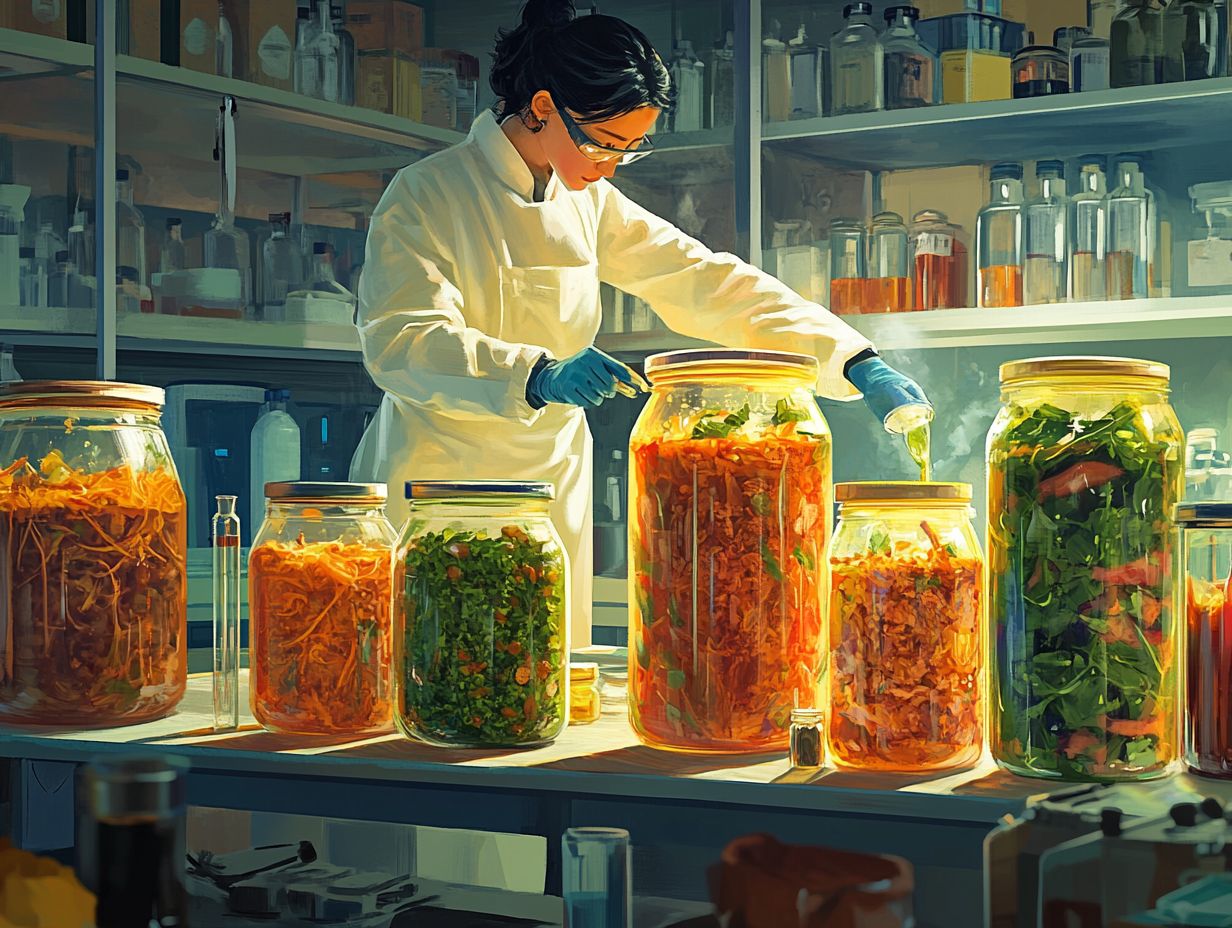
Fermentation is a metabolic process that converts sugar into acids, gases or alcohol. This process is used in food and beverage production to create various products such as beer, wine, cheese, and bread. Industrialization and mass production have further refined these processes, incorporating equipment like bioreactors for efficient production.
What are the benefits of fermentation and the distillation process?
Fermentation can improve the flavor, texture, and nutritional value of food and beverages. It also helps preserve food. Additionally, it promotes the growth of beneficial bacteria in our gut.
Fermentation processes are utilized in the production of low-alcoholic beverages and dietary supplements that cater to modern health trends.
What are some common fermentation techniques?
Some common fermentation techniques include wild fermentation, lactic acid fermentation, and alcoholic fermentation. These techniques use microorganisms such as bacteria and yeast to break down sugars, resulting in different end products.
Ancient civilizations like the Sumerians and Mesopotamia were early adopters of these techniques, creating staples like beer and bread.
What are 5 innovations in fermentation techniques?
1. Controlled fermentation temperature: Modern technology has enabled precise control of fermentation temperatures. This results in improved product consistency and quality.
2. Advanced microbial strains: Scientists have developed new strains of microorganisms that ferment more efficiently, creating unique flavors and aromas.
3. Continuous fermentation systems: This technique constantly feeds new ingredients into a fermentation vessel. It allows for a continuous production process.
4. Fermentation in unusual substrates: Researchers are experimenting with non-traditional substrates such as seaweed and waste products to create new products.
5. Bioreactors: These large-scale fermentation vessels facilitate the production of substantial amounts of fermented products in a controlled environment. These exciting innovations are paving the way for the creation of alternative proteins, food colors, and even PLA (Polylactic Acid), enhancing both the scope and sustainability of the food industry.
How have these innovations impacted the food and beverage industry, including brewing beer?
Innovations in fermentation techniques have boosted efficiency and consistency. This allows for a greater variety of products to flourish. They have opened up new possibilities for using unconventional ingredients, creating unique flavors and textures in food and beverages.
Are there any concerns or controversies surrounding these innovations and fermentation technology?
Some concerns include the potential for genetically modified microorganisms to enter the environment. There is also apprehension about the loss of traditional fermentation methods and cultures. Additionally, the impact of bioreactors on small-scale producers raises questions.
However, many of these concerns are being addressed through regulations and ethical considerations in the industry, along with advancements in fermentation technology.



